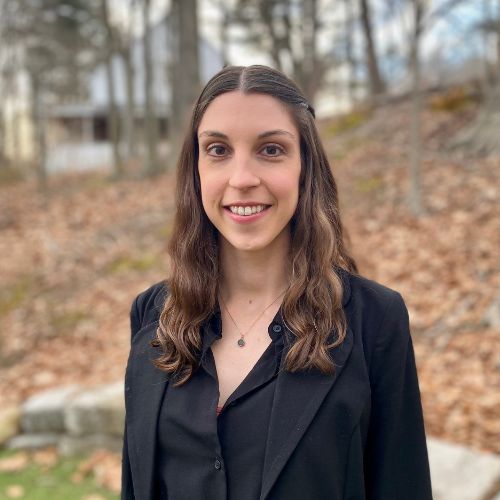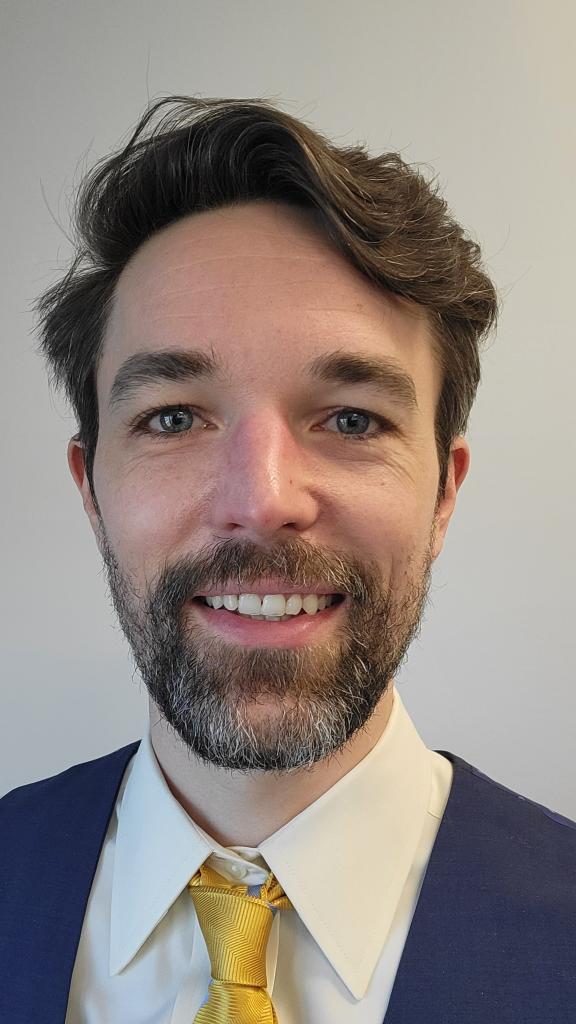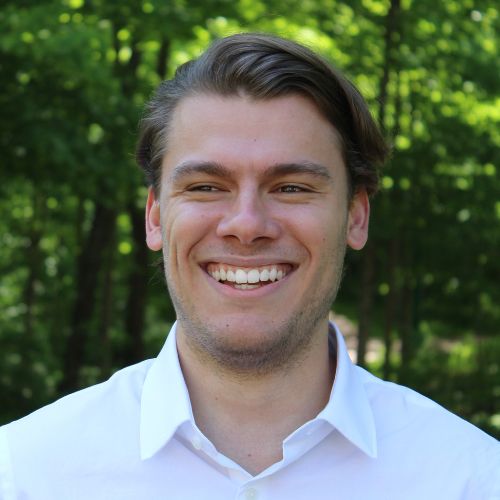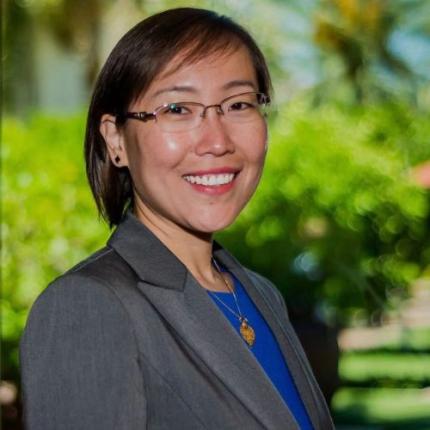Renewable energy jobs and a humanities education go hand-in-hand because transitioning to a clean energy grid is a complex and collaborative human endeavor.
It requires economic analysis, policy buy-in, communication, critical thinking, and the ability to look beyond what is to imagine what could be. In other words, renewable energy jobs require everything a liberal arts education is known for.
Ivan Allen College students and alumni drive change in the field through their work in energy policy, solar incentive programs, sustainable aviation fuel, and much more. Explore some of their stories below!

Grace Fletcher
B.S. in Public Policy and Applied Languages and Intercultural Studies
Fletcher works in the Renewable and Alternative Energy Division at the Massachusetts Department of Energy Resources, where she develops and implements solar incentive programs.
In her role, Fletcher helps utility companies, real estate developers, conservation organizations, and state agencies find common ground among their varied interests. Bringing them together and finding areas of agreement is crucial to moving the energy transition forward in a more efficient and equitable manner, she said.
Why liberal arts?
“Having a policy degree from a STEM-focused school prepared me to enter a technical policy field more confidently and instilled a spirit of fact-based, empathetic decision-making that I have carried into my career,” Fletcher said.
“My position allows me to influence multiple areas of policy at once and to have a tangible impact on issues that matter to me.”
 Ben Staver
Ben Staver
M.S. in Public Policy
Staver works as a rates analyst at Amaren, an energy company in Illinois, where he is responsible for the net metering program. Net metering is a policy that allows people with solar panels to sell the excess power they generate back to energy companies.
Utilities companies in Illinois aren’t allowed to directly invest in renewable energy, so net metering is the only policy tool they have to help support the transition, Staver explained. In his work, he also advocates for a renewable natural gas pilot program using agricultural waste to help power farms.
Why liberal arts?
“During my time in the School of Public Policy, I worked on a project with my advisor, Dr. Marilyn Brown, and a local NGO called Southface. The project helped outside organizations such as Southface better understand utility filings, and the tools I used and the knowledge I gained about utility regulations have been invaluable in my current work,” Staver said.
“My current position puts me right where the rubber meets the road for energy policy. And as Illinois implements aggressive state climate legislation through the Climate and Equitable Jobs Act, it’s an exciting time to be in this field.”

Yifan Liu
Ph.D. candidate in the School of Public Policy
Liu studies how AI can enhance policy analysis and improve decision-making.
In her work, she analyzes the deployment, reliability, and accessibility of electric vehicle charging stations and uses machine learning and spatial analysis to find and fill gaps in charging station placements (especially in historically underserved areas).
Liu also studies consumer feedback and charging patterns to determine the stations’ operational performance, “which is crucial for facilitating a large-scale shift to electric vehicles,” she said.
Why liberal arts?
“My education helps me understand the intersections of technology and society, which allows me to approach energy and environmental policy with a holistic perspective, considering not just the technical aspects but also the societal and ethical implications,” Liu said.
“Historically, many communities have been marginalized during energy transitions, and the current shift toward clean energy raises similar concerns. While technological advancements are inspiring, I am passionate about how the clean energy transition can advance social equity and public policy’s role in ensuring more inclusive outcomes.”
 Jennifer Chirico
Jennifer Chirico
B.S. in Management and Ph.D. in Environmental Policy
Chirico is the associate vice president of sustainability at Georgia Tech, where she oversees the Office of Sustainability and Utilities Management.
In her role, Chirico works with groups across the Institute to plan, develop, and implement clean energy at Georgia Tech. This includes emissions reductions, renewable energy, energy efficiency, water management, circular economy, and sustainable technology and strategy.
Chirico led the development and publication of Georgia Tech’s first Climate Action Plan and co-led the Institute’s 2023 – 2030 sustainability plan, Sustainability Next. The goal of the Climate Action Plan is to reach net zero emissions by 2050 through the implementation of 30 mitigation and adaptation strategies.
Why liberal arts?
“My Ph.D. was instrumental in advancing my sustainability knowledge and providing opportunities to teach, research, and consult with organizations worldwide on sustainability,” Chirico said.

Joanne Tamayo
B.S. in Mechanical Engineering, minors in Public Policy and Global Development
Tamayo is a Clean Energy Senior Specialist at ConEdison, a utility company serving 10 million people in New York City and the surrounding area. She works on the Non-Wires team to identify new, cleaner technologies to replace traditional energy distribution systems (the networks and infrastructure that move energy from power plants to homes and businesses).
The physical grid infrastructure and processes across most of the country must be upgraded to add and efficiently operate renewable energies, Tamayo explained. So, her team supports the renewable energy transition by advocating for and deploying new technologies, such as batteries or power factor correction, which reduce demand during peak energy use and improve the system’s overall performance.
Why liberal arts?
“From my Peruvian culture, I learned the significance of environmental stewardship and reverence for Mother Nature. In college, I became passionate about sustainability and climate change, and IAC gave me the opportunity to explore it. One class led to another, which eventually led to two minors in Global Development and Public Policy, where I focused on sustainability and energy courses.
“I was then fortunate enough to attend the Japan Summer Program in Sustainable Development, where we learned about sustainable public transportation, natural disaster-proofed infrastructure, and international energy policies. It was eye-opening and one of the best experiences I had at Georgia Tech. All these opportunities opened my perspective and inspired me to pursue a career in business, sustainability, energy, and policy, combining everything I learned,” Tamayo said.
“I truly believe that if we all unite — institutions, corporations, policymakers, and individuals — we will have the power to change our world for the better. I am passionate about our collective power and the positive influence each of us can have on our society to curb the effects of climate change. We need each other to make this happen!”
 Ramtin Motahar
Ramtin Motahar
B.S. in Economics and Industrial and Systems Engineering, M.S. in Aerospace Engineering
Motahar is the founder of Joulea, a software company using A.I. to reduce energy usage in commercial buildings.
“As we transition to cleaner energy sources, we also need to make our buildings more efficient,” Motahar said. “They emit more carbon emissions in the U.S. than the entire transportation sector, but we see great opportunities to reduce this based on the technological developments at Joulea.”
Why liberal arts?
“The thread that connects everything in my life was the advanced microeconomics class I took while getting my degree in Economics at Georgia Tech,” he said.

Ollie Chapman
Ph.D. Candidate in the School of Public Policy
Chapman collaborates with Drawdown Georgia (an organization working toward net zero greenhouse gas emissions in the state) and the Brook Byers Institute for Sustainable Systems at Georgia Tech to help the state reduce Georgia’s dependence on fossil fuels and adopt sustainable energy policies.
He uses a mix of modeling, policy analysis, and behavioral economics to help accelerate the adoption of renewable energy technologies and create cleaner, more efficient systems.
In his work, Chapman explores how to make our power grids more flexible, help households transition from gas to electricity, and find renewable-powered solutions for heavy industries.
Why liberal arts?
“The Ivan Allen College fosters an interdisciplinary research approach. Collaborating across different fields and departments has given me new perspectives and ideas, making me a better researcher and making my work more impactful,” Chapman said.
“If we’re serious about reaching net zero, we must invest trillions into the renewable energy transition. The scale is daunting, but if we get it right, it’s also a huge opportunity to address the deep-rooted inequities across the country. Unfortunately, I don’t think we’re fully seizing that opportunity yet. That’s why I’m passionate about ensuring that the energy transition is not only sustainable, but also fair – especially for disadvantaged communities.”
More Alumni Careers in Energy
Matt Cox, Ph.D. Public Policy, played an instrumental role in advancing legislation to help reduce energy burden among low-income residents in Atlanta.
Xiaojing Sun, Ph.D. Public Policy, is the manager of energy analytics at Meta Platforms in San Francisco.
Gunjan Gautam, M.S. Public Policy, works as a Senior Energy Specialist at the World Bank.
Spotlight On: Sustainable Aviation Fuel
Multiple public policy students worked on capstone projects on sustainable aviation fuel in collaboration with UPS, funded by a $500,000 gift as part of the climate and energy strategy initiative.
As the world targets net-zero emissions by 2050, aviation remains difficult to decarbonize. While promising, SAF faces cost-related adoption barriers.
As a recipient of the Byers Family Pathways to Policy Fellowship, Jazmin Lucio received a stipend for a year-long internship in Washington, D.C. She works in Senator Bill Cassidy’s office on climate and trade policy, where she is fostering bipartisan conversations that advance market opportunities for energy decarbonization.
For her capstone, Lucio is creating a global SAF policy map with each policy’s financial valuation to illustrate the impact of policy on price parity between traditional jet fuel and SAF. This tool will incorporate the UPS-Georgia Tech SAF team’s data and will ultimately inform a strategic roadmap for UPS to follow as they navigate SAF as a part of their sustainability goals.


Three Tips for a Career in Renewable Energy
- My advice is to start having conversations and building relationships with people in the industry even before you graduate. People are very willing to give their time and guidance to students, and many future opportunities can arise from “who you know.” I’m happy for interested students to reach out to me directly as well. — Grace Fletcher
- To find a career in this industry, I would think outside of the box because the sustainable careers of tomorrow might not exist today. — Ramtin Motahar
It's important to understand the technology, the market, and the overarching public policy issues. A good education empowers students to answer questions in all three areas for any renewable resource. — Marilyn Brown, Regents' and Brook Byers Professor of Sustainable Systems in the School of Public Policy
Start Your Career With Energy Studies at Georgia Tech
Whether you are looking for a major, minor, graduate degree, certificate, or more, Georgia Tech and the Ivan Allen College of Liberal Arts offer many flexible pathways to a career in renewable energy.
Master of Science in Sustainable Energy and Environment Management (MSEEM)
The MSEEM program covers topics in public policy, business, industrial and systems engineering, city and regional planning, civil and environmental engineering, and economics. Students can conduct hands-on research in the Climate and Energy Policy Laboratory and learn how to assess the context of energy and environmental problems, design responses, and develop solutions.
Economics and Policy of Environmental Sustainability Minor
Did you know that Georgia Tech is the top-ranked public university in energy research? With the EPES minor, you’ll get a cutting-edge education from leading energy economists and connect with interdisciplinary faculty across the institute, putting you at the forefront of the latest research and innovations in energy and environmental sustainability. EPES courses address real-world policy issues related to the environment, climate, natural resources, energy, and sustainability and provide you with the analytical tools needed to tackle them.
The School of Economics also has close ties to the Energy, Policy, and Innovation Center at Georgia Tech. Laura Taylor, the previous chair of the School, directs the center, and many economics and public policy faculty members are faculty affiliates. The two groups also host the annual Southeastern Workshop on Energy & Environmental Economics & Policy.
Global Development Master’s, Minor, and Certificate
Collaborating across disciplines to address emerging challenges is a priority in the Ivan Allen College. Students in the Global Development programs combine courses in economics, international affairs, and city and regional planning.
GTDC: Pathways to Policy
GTDC is an immersive, semester-long experience in Washington, D.C., available to the entire undergraduate community at Georgia Tech. Students connect with policy and practice networks in D.C. to create a strong and enduring network outside Atlanta, gain valuable work experience, integrate scholarly and policy dimensions into their program of study, and explore public service as a possible career path.
GROWER (Grid Resilience, Outage, Weather, Emergency Response) VIP
Georgia Tech's new GROWER VIP is creating the country's most comprehensive real-time power outage tracker for research use. The database will help researchers explore questions about the causes and effects of power outages and how policy interventions can help strengthen grid resilience.







